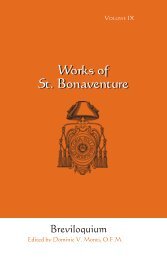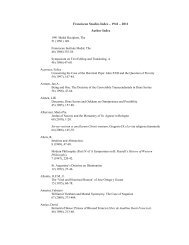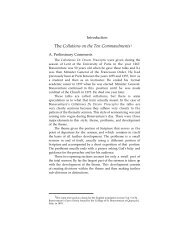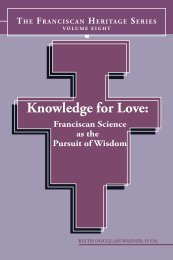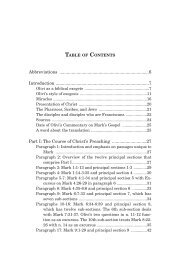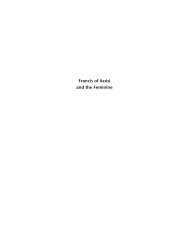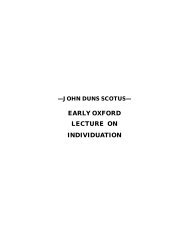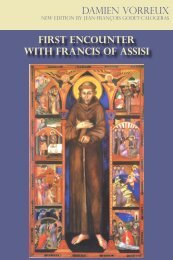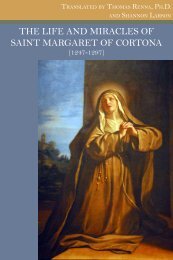FOUR QUESTIONS ON MARY - Franciscan Institute Publications
FOUR QUESTIONS ON MARY - Franciscan Institute Publications
FOUR QUESTIONS ON MARY - Franciscan Institute Publications
You also want an ePaper? Increase the reach of your titles
YUMPU automatically turns print PDFs into web optimized ePapers that Google loves.
PreFace<br />
I have long been interested in making Duns Scotus’s<br />
philosophical and theological writings available in bilingual<br />
editions. It seemed appropriate before the close of the<br />
present Marian Year to add this collection under the title of<br />
John Duns Scotus: Four Questions on Mary. Couched in the<br />
technical format used by professional medieval theologians<br />
in their academic presentations, these questions on particular<br />
aspects of Mariology, hardly make for easy reading. Furthermore,<br />
the fact they were authored by one whose involved<br />
style and depth of thought earned him the title of “The Subtle<br />
Doctor” does not increase their popular appeal. The question<br />
on the Immaculate Conception, however, did have a profound<br />
influence in the decades that followed its composition, so<br />
much so that Scotus also came to be called the “Marian Doctor”<br />
and “The Doctor of the Immaculate Conception.” There<br />
is even considerable evidence that the sobriquet “Subtle Doctor”<br />
itself may have taken on its honorific meaning because<br />
of his defense of Mary’s prerogative, especially at the University<br />
of Paris, the center for Christian theological studies<br />
in the Middle Ages. His proof that Mary could well have<br />
been sinless in every sense of the word and his state ment<br />
that “if the authority of the Church or the authority of Scripture<br />
does not contradict such, it seems probable that what<br />
is more excellent should be attributed to Mary” may seem<br />
modest enough and cautiously worded to us today. But both<br />
at Oxford and even more so at Paris this “new theology” as it<br />
came to be called not only provoked heated opposition in the<br />
theological faculties, even to the point of being called heretical,<br />
but it also found support in academic circles that would<br />
never be fully extinguished. What Scotus said professionally<br />
first at Oxford and then at Paris would be repeated, adopted,<br />
first cautiously and then more boldly. Not only would it find<br />
expression in popular sermons to nourish the devotion of<br />
the faithful but also in the official lectures by bachelors and



